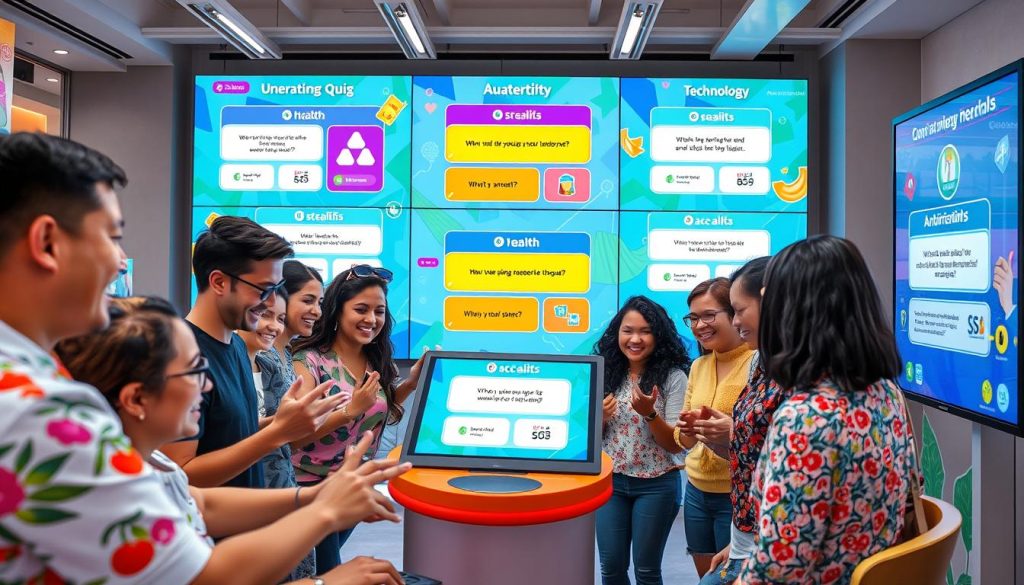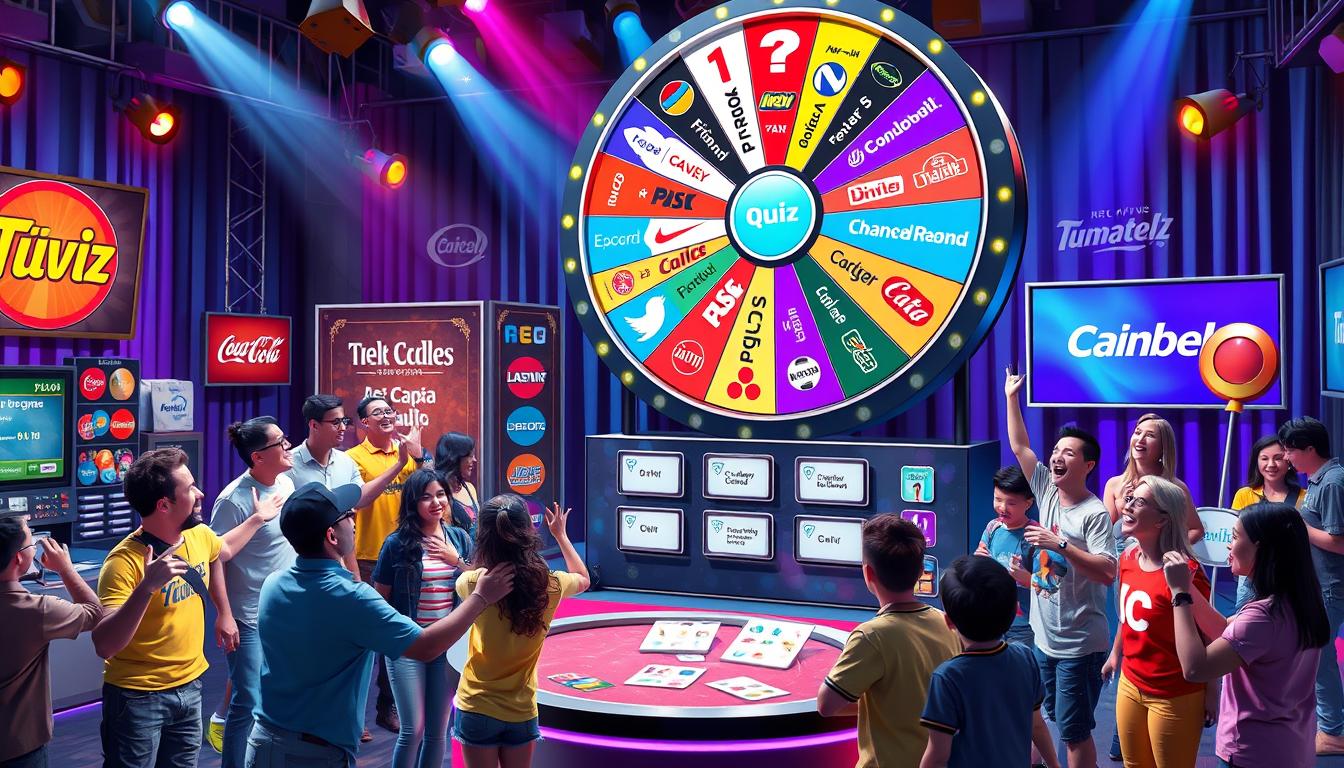Looking to make a splash at your next expo? Quiz games might be your secret weapon. These interactive tools are changing the game in brand awareness, offering a fun way to engage visitors and leave a lasting impression. By using quiz games for brand awareness at expos, companies are tapping into a powerful form of interactive marketing that captivates audiences and boosts recall.
In today’s fast-paced business world, standing out is crucial. That’s where interactive marketing strategies come in handy. They turn passive onlookers into active participants, creating memorable experiences that stick long after the event ends. Quiz games, in particular, offer a unique blend of entertainment and education, making them a hit with expo-goers of all ages.
Whether you’re a Fortune 500 company or a small business, leveraging quiz games for brand awareness at expos can level the playing field. These games not only draw crowds but also collect valuable data, helping you understand your audience better. Plus, they’re a great way to showcase your brand’s personality and expertise in a format that’s both engaging and informative.
Key Takeaways
- Quiz games boost brand awareness at expos
- Interactive marketing strategies increase audience engagement
- Games blend entertainment with educational content
- Suitable for businesses of all sizes
- Provide valuable data insights about your audience
- Showcase brand personality and expertise effectively
Understanding the Power of Interactive Quiz Games in Marketing
Quiz games have become a game-changer in marketing strategies. These interactive tools captivate audiences and create lasting brand impressions. Let’s explore why quiz games are so effective in boosting brand awareness and engagement.
The Psychology Behind Quiz Engagement
People love quizzes because they tap into our natural curiosity and desire for self-discovery. When brands use Gamification Techniques in their marketing, they create an enjoyable experience that keeps participants engaged. This engagement leads to better information retention and a positive association with the brand.
How Quiz Games Drive Brand Recall
Brand Engagement Games like quizzes make your company memorable. When people actively participate in a quiz, they’re more likely to remember your brand later. This recall is crucial for building long-term customer relationships. Email marketing platforms can help you follow up with participants, reinforcing the connection made during the quiz.
Benefits of Interactive Learning in Marketing
Interactive learning through quizzes offers several advantages:
- Increased engagement with your brand
- Better retention of product information
- Fun and memorable experiences for customers
- Valuable data collection for future marketing efforts
By incorporating quizzes into your marketing strategy, you create an educational yet entertaining experience. This approach not only informs your audience but also strengthens their connection to your brand. Remember, the key is to balance fun with valuable content, ensuring participants walk away with both enjoyment and knowledge about your products or services.
Types of Quiz Games That Capture Audience Attention
Quiz games are powerful tools for engaging audiences and creating memorable experiences. At expos, these interactive elements can transform passive observers into active participants, boosting brand recall and fostering connections. Let’s explore some captivating quiz formats that can elevate your experiential marketing campaigns.
Trivia contests remain a classic choice for audience participation activities. These games test knowledge across various subjects, appealing to competitive spirits and drawing crowds. For instance, a tech company might host a “Tech Through the Ages” quiz, challenging attendees to match inventions with their eras.
Personality quizzes offer a more personalized experience. They engage participants by revealing insights about themselves while subtly introducing product lines. A financial services company could use a “What’s Your Investor Type?” quiz to guide potential clients toward suitable products.
Product knowledge challenges serve dual purposes in experiential marketing campaigns. They educate consumers about specific offerings while gauging market awareness. An appliance manufacturer might create a “Smart Home IQ” test, highlighting features of their latest devices.
| Quiz Type | Engagement Level | Brand Recall Impact | Data Collection Potential |
|---|---|---|---|
| Trivia Contests | High | Medium | Low |
| Personality Quizzes | Medium | High | High |
| Product Knowledge Challenges | Medium | Very High | Medium |
By incorporating these diverse quiz formats into your expo strategy, you can create dynamic audience participation activities that leave lasting impressions and drive meaningful interactions with your brand.
How to Leverage Quiz Games for Brand Awareness at Expos
Quiz games are powerful tools for Trade Show Promotions. They engage attendees and boost brand awareness. To make the most of quiz games at expos, careful planning is key.
Setting Up Your Quiz Station
Create an eye-catching booth that draws people in. Use bright colors and clear signage. Place your quiz station in a high-traffic area. Make sure there’s enough space for people to gather without blocking the flow.
Technology Requirements and Setup
Choose user-friendly devices for your quiz game. Tablets or touchscreen displays work well. Ensure a stable internet connection for smooth operation. Have backup devices ready in case of technical issues.
Training Staff for Quiz Management
Prepare your team to run the quiz games effectively. They should know the rules, questions, and prizes inside out. Train them to engage with participants and explain the game clearly. Good staff interaction is crucial for Lead Generation through Games.
- Teach staff how to troubleshoot common tech problems
- Practice handling different participant personalities
- Ensure staff can answer questions about your brand and products
With proper setup and trained staff, your quiz games will be a hit at the expo. They’ll attract crowds, generate leads, and leave a lasting impression of your brand.
Designing Effective Quiz Content for Maximum Impact
Creating quiz content that captivates audiences while reinforcing brand messages is key to successful interactive marketing strategies. By striking the right balance between entertainment and education, you can craft memorable brand experiences that resonate with participants long after the event.

Question Development Strategies
When developing questions for your quiz, focus on topics that align with your brand’s expertise. Mix easy and challenging questions to keep participants engaged. Use a variety of formats, such as multiple-choice, true/false, and fill-in-the-blank, to maintain interest. Remember to keep language clear and concise for maximum impact.
Balancing Entertainment and Education
The key to creating memorable brand experiences lies in finding the sweet spot between fun and informative content. Incorporate interesting facts or surprising statistics about your industry to educate participants while maintaining an entertaining atmosphere. Use humor when appropriate to lighten the mood and make the quiz more enjoyable.
Incorporating Brand Messages Naturally
Weave your brand’s core messages into the quiz content subtly. Frame questions around your products or services without being overly promotional. For example, if you’re a financial services company, include questions about personal finance tips that showcase your expertise. This approach reinforces your brand while providing value to participants.
“The best quizzes are those that leave participants feeling both entertained and informed, creating a lasting positive association with the brand.”
By following these strategies, you can design quiz content that not only engages your audience but also strengthens your brand’s position in their minds, leading to more effective interactive marketing strategies.
Gamification Techniques That Drive Participation
Gamification techniques are powerful tools for boosting audience participation activities at expos. These strategies turn simple quiz games into exciting challenges that keep attendees engaged and coming back for more. Let’s explore some effective methods to amp up your quiz game experience.
Leaderboards create a sense of competition, pushing participants to outdo each other. Display real-time rankings on a big screen to fuel the competitive spirit. Time-based challenges add an extra layer of excitement, encouraging quick thinking and fast responses.
Reward systems are crucial for maintaining interest. Offer tangible prizes like branded merchandise or exclusive discounts to top performers. This not only incentivizes participation but also promotes your brand. Implementing a CRM tool can help track participant engagement and tailor rewards accordingly.
Progressive difficulty levels keep the game challenging and interesting. Start with easy questions to build confidence, then gradually increase complexity. This approach caters to all knowledge levels and keeps participants engaged longer.
| Gamification Technique | Benefits | Implementation Tips |
|---|---|---|
| Leaderboards | Fosters competition, increases engagement | Use dynamic displays, update in real-time |
| Time-based Challenges | Adds excitement, encourages quick thinking | Set appropriate time limits, vary for question types |
| Reward Systems | Motivates participation, promotes brand | Offer diverse prizes, align with brand values |
| Progressive Difficulty | Maintains interest, caters to all skill levels | Gradually increase complexity, provide hints |
By incorporating these gamification techniques, you’ll create a memorable quiz experience that not only entertains but also effectively promotes your brand at expos.
Measuring Success: Analytics and Metrics for Quiz Games
Quiz games have become a powerful tool for Lead Generation through Games. To gauge their effectiveness, businesses need robust analytics and metrics. This section explores key performance indicators, data collection methods, and ROI assessment strategies for quiz-based Interactive Marketing Strategies.

Key Performance Indicators
Tracking the right KPIs is crucial for evaluating quiz game success. Some essential metrics include:
- Participation rate
- Completion rate
- Lead conversion rate
- Social media shares
- Time spent on quiz
Data Collection Methods
Effective data collection is vital for accurate analysis. Popular methods include:
- In-game tracking
- Post-quiz surveys
- Social media monitoring
- CRM integration
ROI Assessment Strategies
Measuring ROI helps justify investment in quiz-based marketing. Consider these strategies:
- Compare lead quality pre and post-quiz implementation
- Calculate cost per lead acquired through quizzes
- Analyze long-term customer value from quiz-generated leads
| Metric | Industry Average | Quiz Game Average |
|---|---|---|
| Lead Conversion Rate | 3% | 7% |
| Engagement Time | 2 minutes | 5 minutes |
| Social Shares | 10 per 1000 views | 25 per 1000 views |
By leveraging these analytics and metrics, businesses can optimize their quiz games for maximum impact. Omnily.io’s CRM system offers robust tools to track and analyze these crucial data points, enabling companies to refine their Lead Generation through Games strategies effectively.
Integration with Social Media and Digital Platforms
Quiz games at expos can gain wider reach through social media integration. By connecting Brand Engagement Games to digital platforms, companies extend their Experiential Marketing Campaigns beyond the event space. This approach creates a lasting impact and builds ongoing relationships with participants.
Social media amplifies quiz engagement in several ways:
- Live streaming quiz sessions to reach remote audiences
- Sharing leaderboards to spark friendly competition
- Posting quiz highlights to generate buzz
- Encouraging participants to share their results
Digital platforms offer unique benefits for quiz integration. Mobile apps allow attendees to participate in quizzes on their own devices, increasing accessibility. Online leaderboards create excitement and drive repeat participation. Email follow-ups with quiz results and brand information keep the connection alive after the expo ends.
To maximize impact, brands should create a cohesive strategy across channels. This includes using consistent branding, messaging, and hashtags. Optimizing product pages linked to quiz content can also boost conversions from engaged participants.
| Platform | Quiz Integration Method | Engagement Tactic |
|---|---|---|
| Live quiz events | Real-time audience participation | |
| Story polls | Visual quiz questions | |
| Hashtag challenges | Rapid-fire quiz rounds | |
| Industry-specific quizzes | Professional knowledge testing |
By leveraging these digital tools, brands can create a seamless experience that bridges the gap between physical expos and online engagement. This integrated approach enhances the overall impact of Experiential Marketing Campaigns and Brand Engagement Games.
Case Studies: Successful Quiz Game Implementations
Let’s dive into real-world examples of quiz games that created memorable brand experiences at expos. These case studies show how companies big and small have used interactive quizzes to boost brand awareness and engage audiences.
Fortune 500 Company Examples
Tech giant Microsoft wowed expo visitors with a “Cloud Computing Challenge” quiz. Players tested their knowledge of Azure services, competing for prizes while learning about Microsoft’s offerings. This clever approach helped Microsoft stand out in a crowded expo hall and drive engagement with potential clients.
Small Business Success Stories
A local craft brewery, Green Mountain Ales, used a “Beer Trivia” quiz game to attract attention at a food and drink expo. Participants learned about brewing processes and beer styles while sampling the company’s products. This fun, educational approach led to a 30% increase in booth traffic and helped the brewery gain new wholesale accounts.
Industry-Specific Applications
In the healthcare sector, medical device maker Medtronic created a “Patient Safety Challenge” quiz for a major industry conference. Doctors and nurses competed to answer questions about best practices in patient care, with Medtronic’s products featured as solutions. This strategy showcased the company’s expertise and generated valuable leads among healthcare professionals.
FAQ
How effective are quiz games for increasing brand awareness at expos?
Quiz games are highly effective for increasing brand awareness at expos. They create interactive experiences that engage attendees, boost brand recall, and make your booth more memorable. By combining entertainment with education, quiz games can significantly increase the time visitors spend with your brand, leading to better awareness and potential lead generation.
What types of quiz games work best for trade show promotions?
The most effective quiz games for trade show promotions include trivia contests, product knowledge challenges, and personality quizzes. Trivia contests can test general knowledge or industry-specific information, product knowledge challenges educate attendees about your offerings, and personality quizzes can create personalized experiences. The best choice depends on your brand, audience, and expo goals.
How can I ensure my quiz game aligns with my brand message?
To align your quiz game with your brand message, focus on creating content that naturally incorporates your brand’s key points. Develop questions that highlight your products’ features, company values, or industry expertise. Balance entertainment and education to keep participants engaged while subtly reinforcing your brand message. Consider theming the quiz around your brand’s visual identity and core messaging for a cohesive experience.
What technology do I need to set up a quiz game at an expo?
The technology needed for a quiz game at an expo can vary, but typically includes:
– Tablets or touchscreen devices for participants
– A large display screen for leaderboards or question display
– Reliable internet connection or offline software
– Quiz game software or app
– Audio equipment for announcements (optional)
Ensure all technology is tested and has backup options to avoid disruptions during the expo.
How can I measure the success of my quiz game implementation?
Measure the success of your quiz game by tracking key performance indicators (KPIs) such as:
– Number of participants
– Time spent at your booth
– Lead generation numbers
– Social media mentions or shares
– Post-expo survey responses
– Brand recall in follow-up communications
Use data collection methods like digital sign-ups, analytics from your quiz software, and booth traffic counters to gather this information.
Can quiz games be integrated with social media for wider reach?
Absolutely! Integrating quiz games with social media can significantly extend your reach beyond the expo. Consider:
– Allowing participants to share their results on social platforms
– Creating a unique hashtag for your quiz game
– Live-streaming quiz sessions on social media
– Offering additional entries or prizes for social shares
This integration can create buzz around your brand and attract more visitors to your booth.
What are some effective gamification techniques for quiz games?
Effective gamification techniques for quiz games include:
– Leaderboards to foster friendly competition
– Timed challenges to add excitement
– Progressive difficulty levels to keep players engaged
– Point systems with rewards or prizes
– Personalized feedback based on performance
– Virtual badges or achievements for completing tasks
These techniques can significantly boost participation and engagement with your brand.
How do I train my staff to manage quiz games effectively?
To train your staff for effective quiz game management:
– Familiarize them with the quiz content and technology
– Practice troubleshooting common technical issues
– Train them to engage participants and explain rules clearly
– Teach them how to collect lead information smoothly
– Ensure they understand your brand message and can answer related questions
– Conduct role-playing exercises to simulate expo conditions
Well-trained staff are crucial for creating a smooth and engaging experience for participants.


